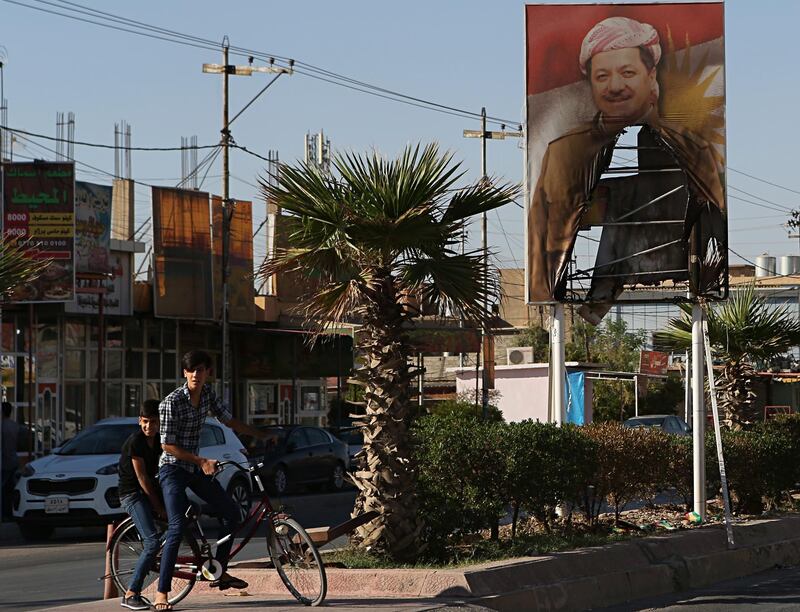Outgoing Iraqi Kurdish president Massoud Barzani says he has no regrets about pushing forward with the referendum for independence that led to the loss of Kirkuk city. Instead, he blames the Kurdish region's woes on Baghdad, the fight against ISIL and the drop in oil prices.
"I don't regret the vote of three million people. The referendum has been successful," said Mr Barzani in an interview with the BBC. "We have around two million IDPs (internally displaced persons) and refugees, that is why we're in this situation, not the referendum, so why should we call it a failure?"
The referendum held in September last year, which produced an overwhelming "yes" for independence, angered Baghdad and Iraq's neighbours, Turkey and Iran, which have their own restive Kurdish minorities. It also brought a rebuke from the United States and European Union, the Iraqi Kurds' western supporters.
Shortly after the September 25 vote, Iraqi prime minister Haider Al Abadi ordered the suspension of international flights to Erbil, the capital of the autonomous Kurdish region. The Iraqi military then launched an offensive to recapture Kirkuk and other areas held by Kurdish forces outside of the autonomous region, in a move that deepened the rift between the two sides.
A convoy of armoured vehicles from Iraq's counter-terrorism forces seized the provincial government headquarters in the centre of Kirkuk on October 16, causing thousands to flee the city.
______________
Read more:
Thousands flee Kirkuk amid fear of war
Baghdad and Erbil move closer to ending crisis
_______________
Kurdish Peshmerga fighters had taken control of the oil-rich city in the summer of 2014, when the Iraqi military fled an ISIL onslaught.
"What happened in Kirkuk was the betrayal of a group of Kurds," said Mr Barzani, in reference to Kirkuk's ruling Kurdish party, the Patriotic Union of Kurdistan (PUK). "Had it not been for the betrayal of a group within Kurdistan, the people wouldn't have suffered the way they had."
"Kirkuk and other Kurdish areas are now occupied," Mr Barzani told the BBC on Friday.
"Talks are continuing and we hope we can reach a mutual resolution," said the former Peshmerga fighter, shifting blame on everyone but his own Kurdistan Democratic Party (KDP).
"We held the referendum to avoid war," he added.
Even before it took place, the referendum was viewed by many as a risky move, especially in Kirkuk, a multi-ethnic city where oil was discovered in the 1930s. The Kurdish region produces around 600,000 barrels per day (bpd) of oil. But the Kurds went ahead with the vote, triggering the deterioration of an already strained Erbil-Baghdad dynamic.
Mr Barzani also warned that ISIL will likely regroup and re-organise. "Fighting terrorism is a top priority, we will not allow them to resurrect in the areas we control."
Last week Mr Al Abadi and Kurdish prime minister Nechirvan Barzani met for the first time since the referendum.
At the meeting, Mr Al Abadi renewed his conditions for lifting restrictions imposed on Erbil after the vote, including a ban on international flights in and out of the Kurdish region.
He said Kurdish airports and border crossings must first come under the control of the federal authorities, according to a statement from his office.






